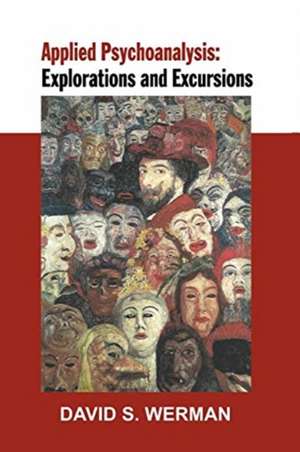Applied Psychoanalysis
Autor David Wermanen Limba Engleză Paperback – 31 ian 2015
Preț: 193.83 lei
Nou
Puncte Express: 291
Preț estimativ în valută:
37.10€ • 38.23$ • 31.32£
37.10€ • 38.23$ • 31.32£
Carte disponibilă
Livrare economică 10-24 februarie
Preluare comenzi: 021 569.72.76
Specificații
ISBN-13: 9780692440834
ISBN-10: 0692440836
Pagini: 256
Dimensiuni: 152 x 229 x 14 mm
Greutate: 0.35 kg
Editura: Ipbooks
ISBN-10: 0692440836
Pagini: 256
Dimensiuni: 152 x 229 x 14 mm
Greutate: 0.35 kg
Editura: Ipbooks
Descriere
Many psychoanalysts, as well as many non-analysts, utilized the concepts relating to the impact of a dynamic unconscious and the effects of early life experiences as a lens through which to enlarge the understanding of a variety of cultural phenomena. Similarly, some writers of fiction used psychoanalytic concepts to characterize their characters.
Notă biografică
David S. Werman was born in NYC in 1922. After serving in WWII, he earned a BA from Queens College and went on to receive his MD at the l'Université de Lausanne in Switzerland. He worked as an obstetrician and gynecologist, and in 1970, changed specialties, settling in at the Department of Psychiatry at Duke University where he taught and practiced psychoanalysis until his retirement in 1992. His professional accomplishments were recognized when he was inducted as a Fellow into the American College of Psychoanalysts. Werman returned to his native New York in 1998, where he lived until his death in 2014. Werman's life-long love of art led him, perhaps inevitably, to the work of James Ensor. Ensor's visions are filled with meaning and double-meaning, fantasy and fear, irresistible for a man who was an MD, a psychoanalyst, a musician, and a lover of art.
